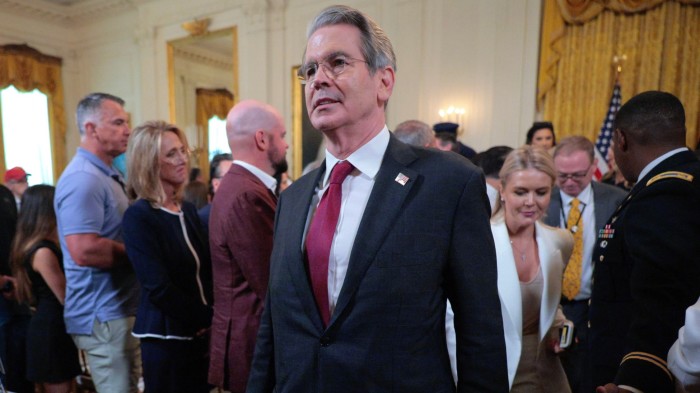The world’s leading economies have agreed a deal to spare the US’s largest companies from paying more corporate tax overseas, throwing into doubt the status of the biggest global tax deal in over a century.
The agreement between Washington and other members of the G7 group of leading countries could fundamentally alter a landmark 2021 accord to set up a global minimum tax to crack down on avoidance by multinationals.
The G7 said on Saturday it had agreed to a “side-by-side solution” of taxation that would exempt American companies from some parts of the new global tax regime because of the taxes they pay in the US.
The G7 added that the agreement would “facilitate further progress to stabilise the international tax system”, including “constructive dialogue” on preserving “the tax sovereignty of all countries”.
The new arrangements are set to be discussed in the coming weeks at the OECD, the international organisation that reached the 2021 minimum tax accord but is dominated by G7 members, according to people familiar with the discussions.
Mathias Cormann, secretary-general of the OECD, described the G7 statement as “an important milestone in international tax co-operation”.
“This is a slam dunk for the United States,” said Robert Goulder, a tax attorney and contributing editor at Tax Analysts, a news service for tax professionals. “I think they’re celebrating by doing high-fives over at the Treasury.”
The shift came after the US included provisions in President Donald Trump’s sweeping “big beautiful bill”, referred to as Section 899, that would have allowed the US to retaliate against alleged discriminatory taxation elsewhere by imposing “revenge taxes” on foreign investments.
Ahead of the G7 statement, Treasury secretary Scott Bessent said he would ask Congress to remove the revenge tax measures from the US legislation because of the impending changes to the OECD deal.
He added that those revisions would save US companies $100bn in tax payments to foreign governments over the next decade.
UK chancellor Rachel Reeves said on Saturday that the G7 agreed that “there is work to be done in tackling aggressive tax planning and avoidance and ensuring a level-playing field”.
“The right environment for this work to happen is without the prospect of retaliatory taxation hanging over these talks, so the removal of Section 899 is welcome,” she added.
Markus Meinzer, director of policy at the Tax Justice Network, a campaign group, labelled the G7 deal a “hasty cave-in” that would leave the minimum tax deal “dead”.
He added: “The US is trying to exempt itself by arm-twisting others, which would make the tax deal entirely useless. A ship with a US-sized hole in its hull won’t float.”
But Manal Corwin, head of tax at the OECD, described the G7 statement as nonbinding, adding that any proposal would need to be approved by 147 countries at the OECD level.
“The G7 on their own cannot make this call,” she added.
The OECD agreement to establish a global minimum tax was reached by more than 135 countries in 2021 to prevent tax avoidance by multinationals and update the international tax system for a digital age.
It established a minimum tax rate of 15 per cent of global profits on the largest multinationals from the US and elsewhere, which was implemented by several countries last year.
Under provisions that particularly angered Republicans in the US, the OECD agreement allowed other countries to levy top up taxes on American companies deemed to be “undertaxed”.
But the OECD rejects the idea that other countries may now back out of the global minimum tax — or that US companies would be at an advantage to businesses from other countries that have adopted the regime.
“If anything, where we were before was uncertainty and an inability to move forward because of various threats of retaliation, that made it very hard and risked abandonment [of the minimum tax],” Corwin said.
She argued that any idea of the US tax system being a “light touch” was “not necessarily accurate”, maintaining that there were “many ways” in which it was stricter.
A French official added that the G7 accord had “made some nods to the US, [by] saying their tax law is helping them being compliant” with the OECD deal “which is a concession but . . . worth it”.
But Joseph Stiglitz, the Nobel economics laureate who is also co-chair of the Independent Commission for the Reform of International Corporate Taxation, said the G7 accord was an indication that governments had “put the interests of multinationals ahead of those of small and medium businesses, their own citizens and average people around the planet”.
He added: “It is unacceptable that some governments are choosing to give up public revenues — especially now, and precisely from the most powerful economic actors.”
The G7 statement also anticipated continuing discussions on the taxation of the digital economy. Digital services taxes have been a point of tension between the US and other countries keen to increase levies on American tech giants.
Donald Trump, US president, said on Friday that he was cancelling trade talks with Canada after Ottawa said it would impose a new tax on tech companies.




